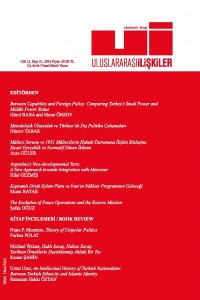Abstract
Bu makale, NATO ‘nun güvenlik desteği sağladığı ve BM, AB, AGİT gibi önemli uluslararası örgütler tarafından icra edilen dörtlü sütun sistemine odaklanarak, Soğuk Savaş sonrası dönemi barış faaliyetlerinin gelişiminde BM Kosova Misyonu’nun gelişimini analiz etmektedir. Çalışmada, Soğuk Savaş sonrası meydana gelen çatışmaların uluslararası toplumu Soğuk Savaş döneminde BM tarafından yürütülen klasik barışı koruma operasyonlarını değiştirmeye zorladığı ve BM liderliğinde Kosova’da yapıldığı gibi askeri ve sivil örgütler tarafından icra edilen ve çatışmaların önlenmesinden barış yapmaya kadar geniş bir yelpazede yer alan çok boyutlu barış operasyonlarının ortaya çıkmasına yol açtığı öne sürülmektedir.
Keywords
References
- ....
Abstract
This article analyzes the role of the United Nations Mission in Kosovo (UNMIK) in the evolution of peace activities
in post-Cold War conflicts, focusing on the four pillar system performed by key international organizations such as
the UN, EU and OSCE, with security support from the NATO. It argues that the nature of post-Cold War conflicts
prompted the international community to change traditional peacekeeping operations, as led by the UN during
the Cold War, leading to the emergence of multidimensional peace operations ranging from conflict prevention to
peacebuilding by civilian and military organizations, such as in Kosovo under UN leadership, despite setbacks.
Keywords
References
- ....
Details
| Primary Language | English |
|---|---|
| Other ID | JA26DA97UR |
| Journal Section | Articles |
| Authors | |
| Publication Date | October 20, 2016 |
| Published in Issue | Year 2016 Volume: 13 Issue: 51 |


